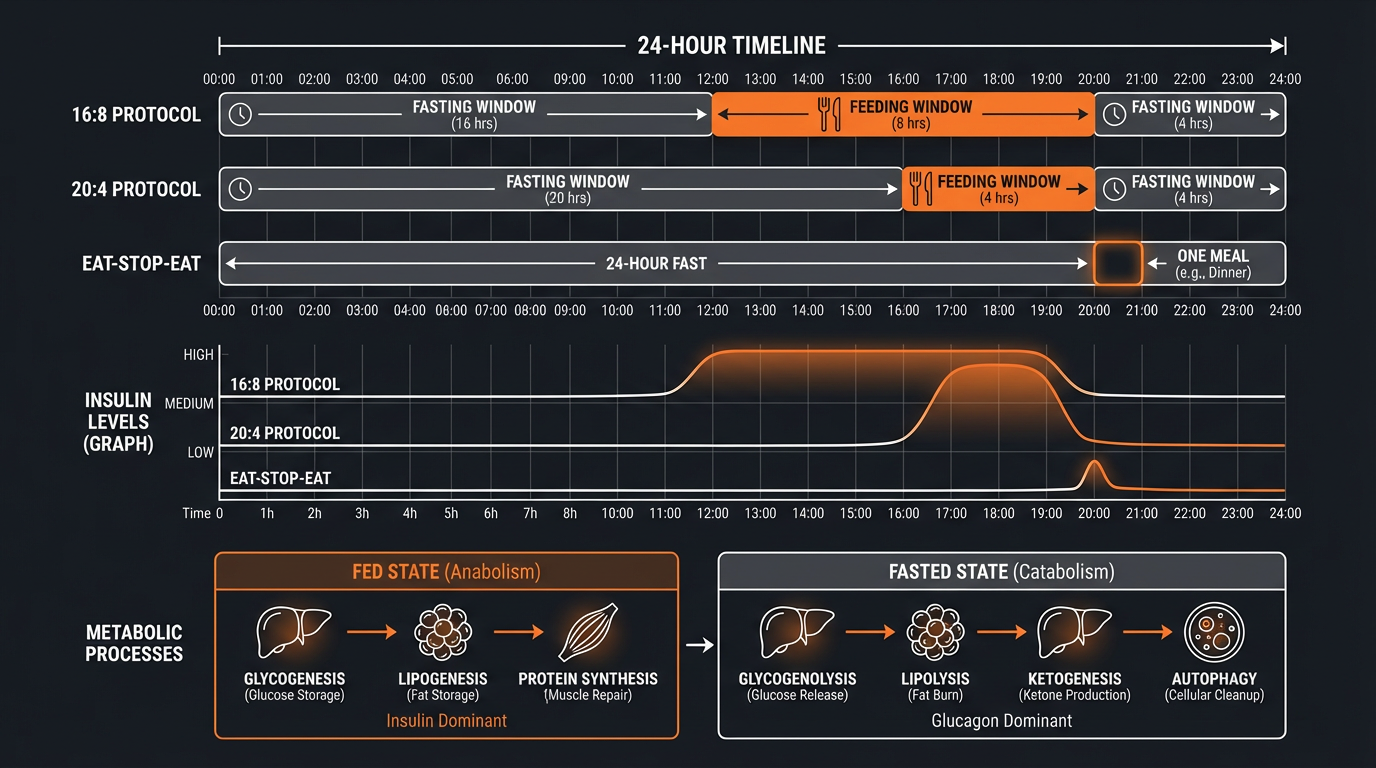Intermittent Fasting and Muscle Growth: Can You Build Mass While Fasting?
Read our comprehensive guide on intermittent fasting and muscle growth: can you build mass while fasting?.

Key Takeaways
- You can build muscle while intermittent fasting if you hit your protein targets of 1.6 to 2.2 grams per kilogram of body weight during your eating window.
- Time your workouts during your eating window or right before breaking your fast so you can slam protein immediately after training.
- Intermittent fasting actually boosts growth hormone levels which helps with muscle growth and fat burning.
- Your body will burn fat for fuel during fasts instead of eating your muscle as long as you keep lifting heavy and eating enough protein.
- The 16/8 method works best for building muscle since you get a solid 8-hour window to pack in all your meals and recovery nutrition.
Get a Free AI Coach on WhatsApp
Ask questions, get workout plans, and track your progress — all from WhatsApp.
Message Your CoachIntermittent fasting (IF) has gained immense popularity in recent years as a strategy for weight loss and overall health improvement. But an intriguing question remains: Can you build muscle while practicing intermittent fasting? This article dives into the research and expert opinions on intermittent fasting and muscle growth.
Understanding Intermittent Fasting
Intermittent fasting is an eating pattern that involves alternating periods of fasting and eating. It doesn't specify which foods you should eat but rather when you should eat them. The most common methods include the 16/8 method, where you fast for 16 hours and eat during an 8-hour window, and the 5:2 method, which involves eating normally for five days and reducing calorie intake for two days.

The Science Behind Muscle Growth
Muscle growth, or hypertrophy, occurs when muscle fibers sustain damage or injury due to exercise, particularly resistance training. The body repairs damaged fibers by fusing them, which increases the mass and size of the muscles. Proper nutrition, especially protein intake, plays a crucial role in this repair process.
A key concern for many is whether intermittent fasting can provide the necessary nutrients required for muscle growth. According to a study published in the *Journal of Translational Medicine*, maintaining a protein intake of about 1.6 to 2.2 grams per kilogram of body weight per day is essential for muscle repair and growth.
Intermittent Fasting and Muscle Growth: The Research
Research on intermittent fasting and muscle growth is still evolving, but several studies suggest that building muscle while fasting is indeed possible. A 2016 study published in the *Journal of the International Society of Sports Nutrition* found that participants who followed a time-restricted eating schedule maintained their muscle mass while reducing fat levels.
Another study indicated that intermittent fasting could enhance the human growth hormone (HGH) levels, which plays a significant role in muscle growth, fat metabolism, and overall physical performance. However, it is vital to combine intermittent fasting with the right workout regimen and balanced nutrition.
Practical Tips for Building Muscle While Fasting
- •Ensure Adequate Protein Intake: During your eating window, prioritize high-protein foods such as lean meats, dairy, and plant-based proteins. Consuming a protein shake post-workout can also help meet your protein requirements.
- •Stay Hydrated: Proper hydration supports muscle function and recovery. Drink plenty of water throughout your fasting and eating periods.
- •Timed Workouts: Schedule your workouts during your eating window to ensure your body has the necessary nutrients for muscle recovery. Some prefer working out at the end of the fasting period and immediately breaking the fast with a high-protein meal.
- •Maintain a Balanced Diet: Include a variety of fruits, vegetables, whole grains, and healthy fats to ensure you get a wide range of nutrients.
Addressing Common Concerns
One common concern is the fear of losing muscle instead of gaining it while practicing intermittent fasting. The body primarily uses glycogen stores for energy during a fast but can switch to fat stores as glycogen depletes. This metabolic flexibility helps preserve muscle mass. Furthermore, incorporating resistance training during your workouts can signal your body to retain muscle.
FAQs About Intermittent Fasting and Muscle Growth
- •Can intermittent fasting lead to muscle loss? While there may be some initial muscle loss, maintaining a proper diet and exercise routine can minimize this risk.
- •How long should my fasting periods be? The 16/8 method is a practical starting point. Adjust according to your personal goals and how your body responds.
- •What should I eat during my eating window? Focus on nutrient-dense foods rich in protein, healthy fats, and complex carbohydrates.
Conclusion
In summary, building muscle while practicing intermittent fasting is not only possible but can be effective when approached correctly. Align your eating and workout schedules, prioritize a protein-rich diet, and ensure adequate hydration to optimize results. If you're new to intermittent fasting, consider consulting with a healthcare professional or a nutritionist to tailor a plan to your specific needs.
Embrace the science, listen to your body, and embark on this unique journey to achieve your fitness goals. Ready to start? Join a community of like-minded individuals and share your progress!
Frequently Asked Questions
- Can you build muscle while doing intermittent fasting?
- You can, but it's harder. Cramming enough protein and calories into a 6-8 hour window is tough, and you're missing protein synthesis windows during your fasting period. If your main goal is gaining mass, IF isn't the best approach.
- What intermittent fasting schedule is best for muscle building?
- If you insist on IF while bulking, use a 16:8 protocol and place your eating window around your workout. A 14:10 split is even better since it lets you fit in more meals.
- Will fasting cause muscle loss?
- Short fasts of 16-20 hours won't cause significant muscle loss if you eat enough protein and calories in your feeding window. Extended fasts beyond 24 hours can start breaking down muscle tissue, especially if you're lean.
- Should I train fasted or fed for muscle growth?
- Fed, every time. Training with some protein and carbs in your system leads to better performance, better recovery, and more muscle growth. Fasted training only makes sense during a cut if meal timing forces it.